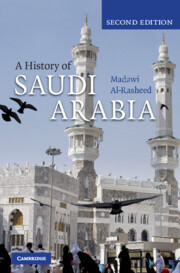Book contents
- Frontmatter
- Contents
- List of illustrations
- List of tables
- Preface
- Chronology
- Glossary
- Map 1 Saudi Arabia, main regions and cities
- Map 2 Saudi Arabia, main tribes
- Introduction
- 1 Society and politics, 1744–1818 and 1824–1891
- 2 The emerging state, 1902–1932
- 3 Control and loyalty, 1932–1953
- 4 The politics of dissent, 1953–1973
- 5 From affluence to austerity, 1973–1990
- 6 The Gulf War and its aftermath, 1990–2000
- 7 Narratives of the state, narratives of the people
- 8 The challenges of a new era
- 9 Modernising authoritarian rule
- Conclusion
- Appendix I Al Saʿud rulers in Dirʿiyyah (1744–1818)
- Appendix II Al Saʿud rulers in Riyadh (1824–1891)
- Appendix III Ibn Saʿud's sons (1900–1953)
- Notes
- Bibliography
- Index
7 - Narratives of the state, narratives of the people
Published online by Cambridge University Press: 05 August 2012
- Frontmatter
- Contents
- List of illustrations
- List of tables
- Preface
- Chronology
- Glossary
- Map 1 Saudi Arabia, main regions and cities
- Map 2 Saudi Arabia, main tribes
- Introduction
- 1 Society and politics, 1744–1818 and 1824–1891
- 2 The emerging state, 1902–1932
- 3 Control and loyalty, 1932–1953
- 4 The politics of dissent, 1953–1973
- 5 From affluence to austerity, 1973–1990
- 6 The Gulf War and its aftermath, 1990–2000
- 7 Narratives of the state, narratives of the people
- 8 The challenges of a new era
- 9 Modernising authoritarian rule
- Conclusion
- Appendix I Al Saʿud rulers in Dirʿiyyah (1744–1818)
- Appendix II Al Saʿud rulers in Riyadh (1824–1891)
- Appendix III Ibn Saʿud's sons (1900–1953)
- Notes
- Bibliography
- Index
Summary
Heritage is not a hearth made of mud, its fire turned to ashes in a gas burner. Heritage is not a dalla (coffeepot) or matʾouba (brass water container) or esʾhala (milk container) or mehmass (roasting container) or a zinbeel (straw basket) with broken handles. Heritage is not a nabti poem or a Najdi dance. Heritage is not houses made of hay and mud or okt (cheese snacks) made of a racing camel's milk … Turath (heritage) is the people in their joy and sorrow, defeat and victory, in their dreams that take refuge in the future.
(Fawziyya Abu-Khalid, translated in Arebi 1994: 57–8)Although the Saʿudi state is now highly visible, thanks to the infrastructure it has created, its relations with its people and history remain contentious. For this reason, state-sponsored representations of the past, embedded in official historiography, political rhetoric and festivities create a historical memory that serves to enforce obedience to the ruling group. Oil wealth has not only enabled the state to promote economic modernisation but has also created historical narratives that encourage a new kind of legitimacy. While the state dominates the material infrastructure and resources of the country, it has become increasingly important to extend this domination to the symbolic realm of ideas and visions of the past, present and future.
- Type
- Chapter
- Information
- A History of Saudi Arabia , pp. 182 - 210Publisher: Cambridge University PressPrint publication year: 2010



